Watch
February 2012. Pulitzer Center on Crisis Reporting’s video of me talking about my reporting in India
September 12, 2010. Video dialog with Randi Hutter Epstein, author of Get Me Out, Bloggingheads.tv
August 2, 2010. Lecture at Politics & Prose bookstore, Washington, DC. Part 1 of 5. Video courtesy of C-Span BookTV
August 2, 2010. Lecture at Politics & Prose bookstore, Washington, DC. Part 2 of 5. Video courtesy of C-Span BookTV
August 2, 2010. Lecture at Politics & Prose bookstore, Washington, DC. Part 3 of 5. Video courtesy of C-Span BookTV
August 2, 2010. Lecture at Politics & Prose bookstore, Washington, DC. Part 4 of 5. Video courtesy of C-Span BookTV
August 2, 2010. Lecture at Politics & Prose bookstore, Washington, DC. Part 5 of 5. Video courtesy of C-Span BookTV
December 3, 2009. Highlights from appearance on “Author’s Showcase.”
November 2006. Lecture on The Body Hunters at the Frontline Club in London
January 2008, Clip from appearance on History Channel documentary, “Crude”
Listen
November 21, 2011. Is the Private Sector Changing Global Health Priorities? on NPR’s “To the Point”
Two decades ago, the World Health Organization and other public agencies were the leaders in improving health in the developing world and battling the private sector on issues like infant formula and tobacco. But today, inter-governmental bodies like the WHO are being outpaced by private sector efforts led by multi-national businesses such as Coca-Cola, Exxon Mobil and drug companies like Pfizer. What’s driven the change? Why have some of the corporations blamed for public health problems become leaders in the global fight against deadly disease? Are there conflicts of interest?
Guests:
- Sonia Shah: science journalist and author, @soniashah
- Pam Bolton: GBC Health, @GBCHealth
- Bill Jeffrey: Center for Science in the Public Interest Canada, @BillJeffreyCSPI
- Daniel Altman: Dalberg Global Development Advisors, @altmandaniel
August 3, 2010. Malaria & Humankind. Interview on “Think with Krys Boyd,” NPR Dallas. Listen at KERA.
How can a pathogen infect 500 million and kill nearly a million each year when we know how to control it? We’ll talk this hour with Sonia Shah who tells the story of this deadly parasite in her new book “The Fever: How Malaria Has Ruled Humankind for 500,000 Years” (Farrar, Straus and Giroux, 2010).
August 2, 2010. Bug Off! Interview on SETI “Are We Alone,” Science Radio for Thinking Species.

What you can’t see … can make you sick. Humans have been battling viruses and bacteria since the beginning of time. The malaria parasite has been keeping deadly company with us for 500,000 years. King Tut had it and so did Julius Caesar. What’s keeping this bug going today?
Also, how disease almost halted the most ambitious engineering project in the world … how elite disease detectives puzzle out perplexing epidemics … And – could tiny bugs from spaaace, ace, ace be our ancestors?
Guests:
- Sonia Shah – Author of The Fever: How Malaria Has Ruled Humankind for 500,000 Years
- Michael Conniff – Historian, director of Global Studies at San Jose State University, and author of Black Labor on a White Canal: Panama, 1904-1981 (Pitt Latin American Series)
- Mark Pendergrast – Author of Inside the Outbreaks: The Elite Medical Detectives of the Epidemic Intelligence Service
July 20, 2010. “Malaria: The 500,000-year-old ‘Fever’ That Won’t Die,” Interview on “Fresh Air with Terry Gross.” Listen at npr.org
Malaria, the mosquito-borne infectious disease, has been almost entirely eradicated in the United States for the past 60 years, but continues to infect millions of people around the globe, mainly in parts of sub-Saharan Africa and in subtropical areas.
Each year, between 300 million and 500 million people are afflicted with malaria. The main typical symptoms are fever and chills, but several complications — which can lead to convulsions, hallucinations and even death — occur in a small percentage of cases.
In The Fever: How Malaria Has Ruled Humankind for 500,000 Years, journalist Sonia Shah weaves together a social history of the disease, which has plagued humans for thousands of years and shows no sign of slowing down, despite being treatable with drugs.
In an interview on Fresh Air, Shah tells Terry Gross that prompt treatment and knowing where the infected mosquitoes live and breed are the best ways to avoid malarial infection.
March 12, 2010. Radio interview, “The Jeff Farias Show,” http://www.thejefffariasshow.com/
We spoke earlier with Sonia Shah writes about science, medicine, and international politics. She is the author of “The Fever: How Malaria Has Ruled Humankind for 500,000 Years,” (2010), “The Body Hunters: Testing New Drugs on the World’s Poorest Patients“ (2006) and “Crude: The Story of Oil” (2004). Her writing has appeared in The Nation, The Lancet, Yale’s e360, and elsewhere. Shah was born in 1969 in New York City to Indian immigrants. Growing up, she shuttled between the northeastern United States where her parents practiced medicine and Mumbai and Bangalore, India, where her extended working-class family lived, developing a life-long interest in inequality between and within societies.
Sonia holds a BA in journalism, philosophy, and neuroscience from Oberlin College, and lives with molecular ecologist Mark Bulmer and their two sons Zakir and Kush. We started by discussing her recent Ms article onTED lectures & Malaria. Listen.
March 9, 2010. Radio interview, “Late Night Live” with Philip Adams, Radio National (Australia).
Malaria has been around for five hundred thousand years, but shockingly, the global death toll from malaria has continued to rise since the 1980s. The parasite has developed ever more lethal versions of itself and it now kills a million people a year. Sonia Shah is a self-confessed mosquito-hater. She’s travelled the world tracking down the malaria disease, and has written a book about it. Listen.
April 24, 2008. Podcast, “Resurgent Malaria” End Poverty Podcast, UN Millennium Campaign.
Journalist Sonia Shah discusses the importance comprehensive policies in the fight to eradicate malaria. Listen
January 13, 2010. Radio Interview, “Why are bees, bats and amphibians dying?” Steve Barnett Show, Progressive Radio Network, Listen
——-
For more
Check out Sonia’s YouTube channel here.



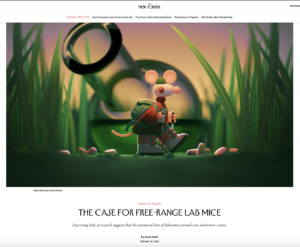
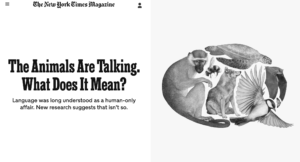
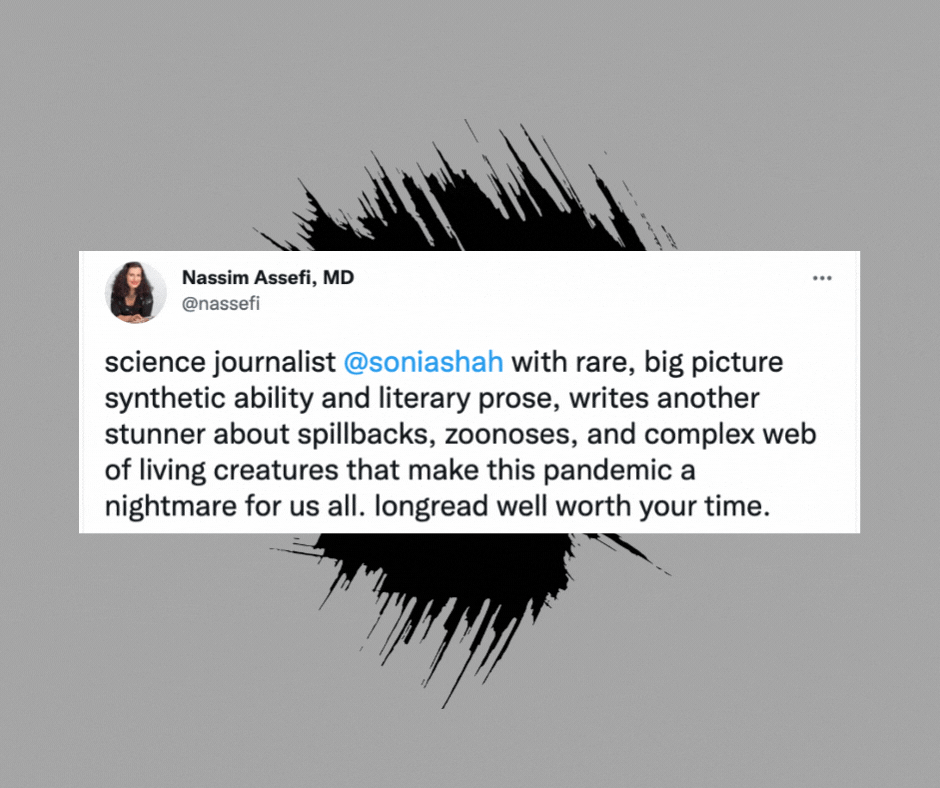
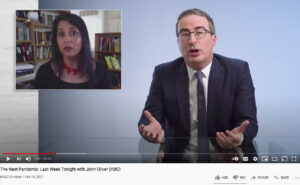
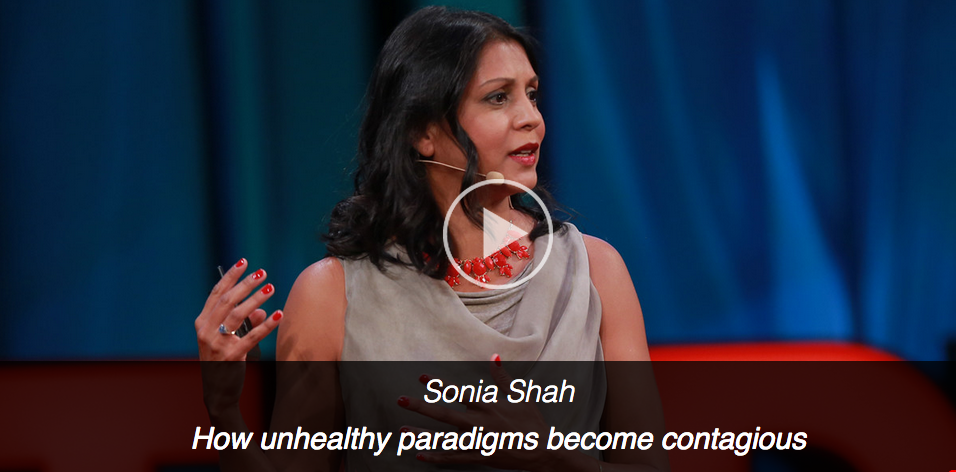
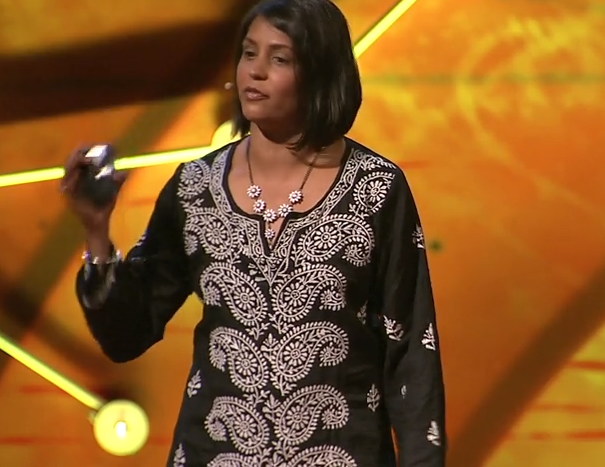




Leave a Reply